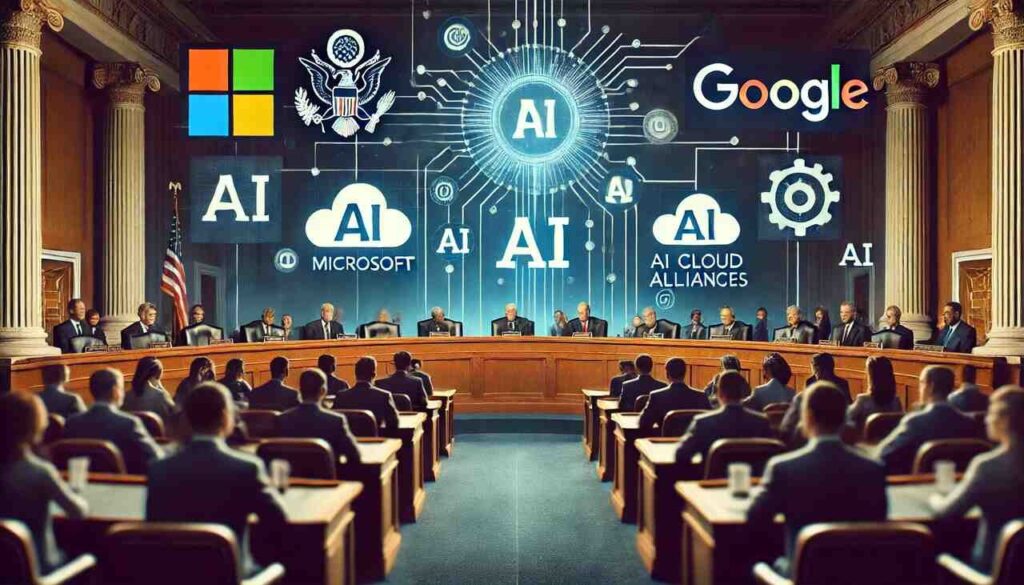Why Are U.S. Lawmakers Intensifying Oversight on Microsoft and Google’s AI Cloud Partnerships?
U.S. Senators are launching bipartisan investigations into the AI cloud partnerships formed by Microsoft and Google, focusing on potential national security vulnerabilities, market consolidation, and the outsourcing of critical AI infrastructure to foreign-linked entities. The scrutiny arises as both tech giants accelerate collaborations with AI startups, such as OpenAI, Anthropic, and Mistral, many of which rely heavily on hyperscaler cloud platforms for training and deployment.
Senators from both parties question whether these alliances pose threats to U.S. technological sovereignty, raise anti-competitive red flags, or allow unchecked foreign influence, especially from China-based investors indirectly tied to these startup ecosystems.
What National Security Concerns Are Driving Senate Inquiries Into AI Cloud Deals?
Dependency on Foreign-Linked Startups
Senators express concern that U.S.-based cloud providers may become conduits for foreign adversaries to gain influence over AI systems that underpin government infrastructure, defense operations, and public services.
Sensitive Data Exposure Through AI APIs
AI partnerships often involve cross-platform access to LLM APIs, which may inadvertently expose sensitive datasets, including biometric, financial, or geolocation information, especially when deployed across government and healthcare sectors.
Opaque Investment Flows and Equity Stakes
Lawmakers highlight the risk posed by indirect foreign ownership, especially venture capital funds with limited transparency, that could allow Chinese-backed interests to indirectly influence or access AI innovations through partnerships with U.S. cloud providers.
Dual-Use Technology Risks
AI systems developed in partnership with hyperscalers may possess dual-use capabilities, such as surveillance or autonomous targeting, which pose ethical and national security implications if exported or repurposed by hostile regimes.
How Do Microsoft and Google Structure Their AI Cloud Collaborations?
Equity and Infrastructure Bundling
Microsoft’s partnership with OpenAI includes exclusive cloud hosting on Azure and a multibillion-dollar equity stake, effectively binding model training, deployment, and commercialization within Microsoft’s cloud ecosystem. Google’s collaboration with Anthropic mirrors this model via Google Cloud TPU access and a capital infusion exceeding $2 billion.
Preferential Access to Proprietary Models
These agreements often provide the cloud provider with first-party access to cutting-edge LLMs, such as GPT-4 and Claude, giving them a market edge over other cloud competitors in the AI-as-a-service domain.
AI Chip and Compute Lock-in
Through these partnerships, Microsoft and Google also promote exclusive AI chip stacks, like Microsoft’s Maia and Google’s TPU v5, locking startups into proprietary infrastructures that reduce interoperability and open market competitiveness.
Joint Productization and Monetization
Both tech giants co-develop AI tools, integrate them into enterprise SaaS offerings, and monetize them through cloud-native subscriptions, further centralizing AI commercialization within a limited ecosystem.
What Competitive and Antitrust Issues Are Senators Investigating in These Deals?
Market Gatekeeping by Hyperscalers
Senators are evaluating whether Microsoft and Google’s AI alliances restrict market entry for independent or smaller cloud providers by creating a vertical monopoly over compute, models, and distribution channels.
Control Over AI Innovation Pipelines
By owning or dominating access to the most powerful AI models, both companies may limit innovation diffusion, allowing them to control which models are developed, scaled, and integrated across sectors.
Bundled Service Dependencies
AI startups may be coerced into long-term exclusive cloud contracts, reducing pricing transparency, limiting vendor flexibility, and discouraging open-source alternatives from emerging.
Opaque Governance Structures
Lawmakers are scrutinizing the lack of clear governance in partnerships where IP rights, profit-sharing mechanisms, and ethical AI oversight are vaguely defined or unevenly distributed in favor of the cloud provider.
Which AI Startups Are Central to the Government’s Investigation?
OpenAI (Partnered with Microsoft)
Receives billions in funding while building closed-loop infrastructure with Microsoft Azure. Controls access to GPT-4, powering a significant share of public and enterprise AI deployments.
Anthropic (Partnered with Google)
Backed by Google Cloud, Anthropic develops Claude models. Senators are reviewing whether Google’s equity and infrastructure ties allow it to exert undue influence over Claude’s direction and deployment.
Mistral (Backed by Multiple Entities)
Though European, Mistral’s collaborations with U.S. cloud providers and Chinese co-investors raise flags around foreign influence vectors in AI modeling and compute infrastructure.
Inflection AI (Linked to Nvidia and Microsoft)
Develops personal AI agents with high compute dependency. Concerns include cross-collaboration between cloud infrastructure, LLM providers, and chip manufacturers, which could consolidate AI pipeline control.
How Might Regulatory and Policy Outcomes Shape the Future of AI Cloud Governance?
Proposed Legislation on Foreign Ownership Disclosure
New bills may require AI startups and cloud providers to publicly disclose foreign equity stakes, particularly from adversarial states or investment firms with opaque structures.
Structural Separation of Cloud and AI Services
Lawmakers are considering regulations that would disallow hyperscalers from simultaneously owning infrastructure and equity in AI companies, enforcing a separation akin to telecom regulations.
Public-Private Oversight Boards for AI Partnerships
Senators are pushing for federal oversight boards that would monitor strategic AI partnerships, review funding sources, and evaluate model usage for national security implications.
Antitrust Investigations and FTC Actions
The FTC may initiate inquiries into whether Microsoft and Google’s AI bundling practices violate antitrust laws, leading to potential break-up orders or restrictions on exclusive AI access deals.
Conclusion
The convergence of cloud hyperscalers with frontier AI startups creates a new axis of technological concentration, with implications for economic competition, national sovereignty, and algorithmic accountability. U.S. Senators are signaling that unchecked consolidation of compute power, model access, and AI infrastructure could lead to systemic vulnerabilities, both commercial and geopolitical. As investigations intensify, Microsoft and Google face a future where AI transparency, open-market principles, and national security safeguards may redefine the boundaries of acceptable innovation governance.
For more exciting news articles you can visit our blog royalsprinter.com

